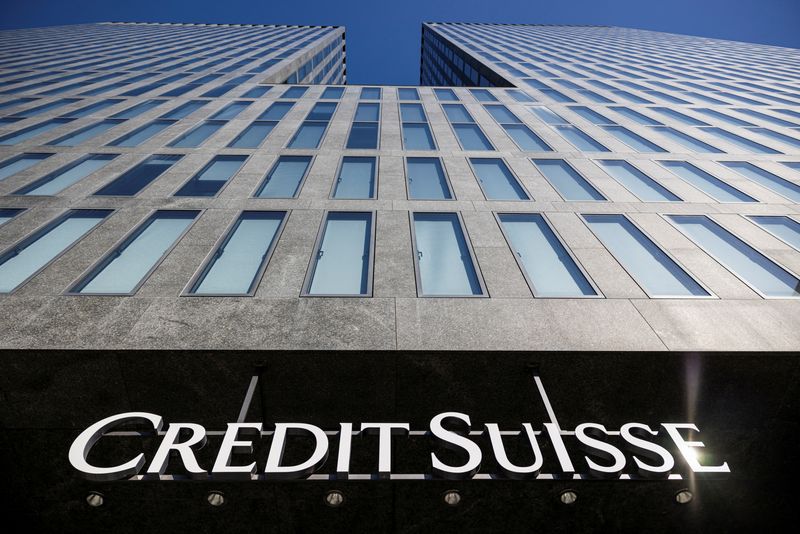By Naomi Rovnick and Sumanta Sen
LONDON (Reuters) - Banking sector turmoil has not dented demand for equities, with MSCI's world stock index up 7% so far this year.
Hopes that the Federal Reserve and others could soon pause the most aggressive interest rate hiking cycle in decades has supported stocks even as sentiment more generally has been rattled by the failures of two U.S. lenders and Credit Suisse's shotgun merger with UBS.
But under the surface, bad omens for world stocks are building.
1/ TIGHTER CREDIT
Customers have whipped deposits out of U.S. regional banks and Swiss authorities' shock wipeout of $17 billion worth of Credit Suisse bonds has rattled a key market for European bank funding.
Analysts say this undermines the sector's ability to lend money to companies. Central bank surveys show U.S. and European banks are already tightening lending standards, historically a predictor of dismal stock market performance.
When financing is scarcer companies pay more for loans, hurting profits and share prices.
"Tightening lending standards tend to correlate with recessions, and the stock market tends to fall during recessions," said Jason Da Silva, senior research analyst at London bank Arbuthnot Latham. "This is not a good sign."
GRAPHIC - Stocks and recession- Credit tightening
https://www.reuters.com/graphics/STOCKS-RECESSION/GRAPHIC/lbpggwrqbpq/1.-Lending-attitudes.jpg
2/ MANUFACTURING SLOWDOWN
Recessions starting in the United States tend to flow to the rest of the world and consequently global stocks.
The U.S. ISM manufacturing index, a leading indicator of economic activity, dropped to its lowest since May 2020 last month and signaled a fifth straight month of contraction.
The data showed "a recession is due pretty soon in the U.S. and other advanced economies," said Capital Economics senior markets economist Oliver Allen. "That downturn is going to start to weigh on risky assets pretty heavily."
GRAPHIC - Stocks and recession - PMIs
https://www.reuters.com/graphics/STOCKS-RECESSION/GRAPHIC/lgpdkxmrovo/2.-PMI-vs-MSCI.jpg
3/ TECH HOLDS THE CARDS
Stock market gains so far in 2023 have been dominated by tech stocks, an industry that may not be immune to recession.
Tech, the largest sub-index of the MSCI World, has jumped 20% so far this year; other big sector constituents such as banks , healthcare and energy are flat or lower.
The U.S. S&P 500 index rose 7% in the first quarter, in a gain it has held onto since. Seven mega-cap tech stocks were responsible for 92% of the S&P 500's first-quarter rise, Citi notes.
The bank's head of U.S. equity trading strategy, Stuart Kaiser, said institutional investors view big tech companies, which generally have strong balance sheets and low debt, as a shield against a credit squeeze.
The defensive tech trade could work in a shallow recession. But in a deep downturn, Kaiser cautioned, money managers may dump tech too: "The next step would be just to sell stocks."
GRAPHIC - Tech concentration
https://www.reuters.com/graphics/STOCKS-RECESSION/GRAPHIC/zdvxdaoozvx/chart.png
4/ FINANCE WOBBLES
March was the first month in 20 years where financial stocks fell 10% or more and the MSCI World index did not drop, Morgan Stanley (NYSE:MS) research shows.
This historical relationship may have faltered because the market "does not believe there will be meaningful contagion from the financial sector into the broader economy," Morgan Stanley chief European equity strategist Graham Secker said.
Florian Ielpo, head of macro at Lombard Odier Investment Management, who has held an underweight position on global stocks since January 2022, cautioned banking troubles could still pull overall stocks lower.
"Banks are likely to lend a lot less to the economy," Ielpo said. Higher costs of credit will weaken earnings, he added, prompting "a moment of reckoning" when equity holders switch allocations to bonds.
GRAPHIC - World stocks rise as financial shares fall
https://www.reuters.com/graphics/STOCKS-RECESSION/GRAPHIC/zdpxdaymzpx/chart.png
5/ FINALLY, THE YIELD CURVE
U.S. Treasury yields are higher than those on 10-year peers. This so-called yield curve inversion, often a harbinger of recession, last month became the deepest in 42 years.
Since 1967, yield curve inversions have occurred 15 months before recessions, on average, Barclays (LON:BARC) research shows.
While stocks can rise as the yield curve inverts, the rally is not often sustained. The S&P 500 on average hit a cycle peak just four months before a U.S. recession begins, Barclays found.
"It is not unusual for equities to keep rising even as (the) yield curve inverts," Barclays head of European equity strategy Emmanuel Cau said. "But the bond market is looking ahead and of the view that current activity strength won't last."
GRAPHIC - Bond market flashes recession signal

https://www.reuters.com/graphics/STOCKS-RECESSION/GRAPHIC/jnpwylgqgpw/chart.png
(This story has been corrected to say U.S. S&P 500 index, not UK, in paragraph 18)